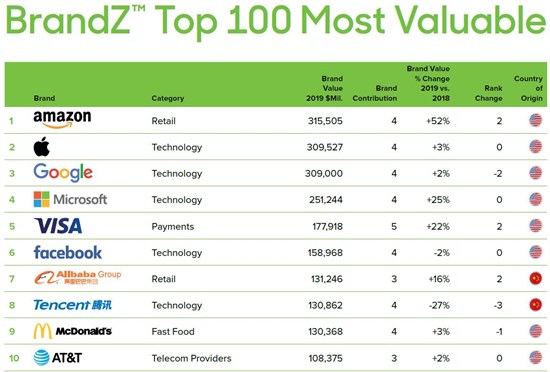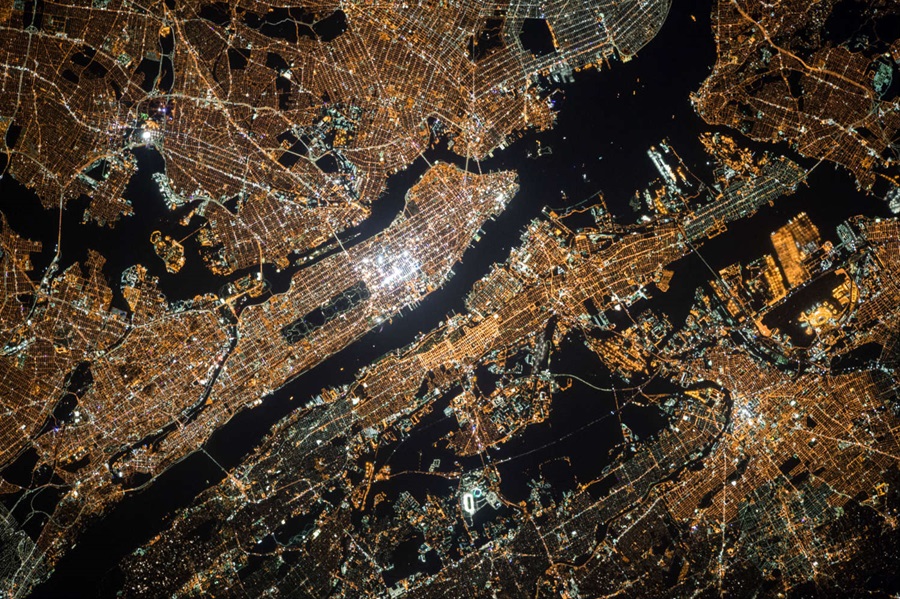Amazon has become the world’s most valuable brand, according to the 2019 BrandZTM Top 100 Most Valuable Global Brands ranking released today by WPP and Kantar at the New York Stock Exchange.
Amazon’s smart acquisitions, that have led to new revenue streams, excellent customer service provision and its ability to stay ahead of its competitors by offering a diverse eco-system of products and services, have allowed Amazon to continuously accelerate its brand value growth.
Technology companies have led BrandZ’s Top 100 ever since its first global brand value ranking in 2006, when Microsoft took the top spot. Rising in brand value by an impressive 52% year-on-year to $315.5 billion, Amazon moves ahead of Apple (no.2, $309.5 billion) and Google (no.3, $309 billion) which both rose by a modest +3% and +2% respectively, to end the technology giants’ 12-year dominance.

In the Top 10, Facebook remained at no.6 while, for the first time, Alibaba overtook Tencent and became the most valuable Chinese brand, moving up two places to no.7 and growing +16% to $131.2 billion. Tencent dropped three places to no.8, declining by 27% to $130.9 billion year-on-year, in what BrandZ ascribes to a more volatile world; one in which brands must continually anticipate evolving consumer needs and expectations.
As other social media platforms face challenges in terms of trust and desirability, Instagram (no.44, $28.2 billion), now with over 1 billion users worldwide, emerged as this year’s fastest riser climbing 47 places with a massive +95% growth in brand value. Lululemon, the yoga-inspired, athletic apparel company was the second-fastest riser, stretching to +77% growth year-on-year to $6.92 billion.
Other top risers, such as Netflix (+65%, no. 34, $34.3 billion), Amazon (+52%, $315.5 billion) and Uber (+51%, no.53, $24.2 billion) reflect the rapidly changing, technology-driven world in which consumers are placing more value on richer brand experiences.
“The growth in value of this year’s top 100 brands to an all-time high proves the power of investing in brands to deliver superior shareholder value. Behind this headline growth figure lies the success coming from a new phenomenon of ecosystem brand building,” said David Roth, chief executive officer of The Store WPP EMEA and Asia and Chairman of BrandZ. “We’re seeing a move from individual product and service brands to a new era of highly-disruptive ecosystems. Brands need to understand the value this type of model can create and should embrace its approach to be successful in the future.”
Despite the economic uncertainty surrounding the US and China trade tariffs, almost a third of a trillion dollars ($328 billion) of value was added to the BrandZ Top 100 Global ranking over the last year, giving it a combined brand value of $4.7 trillion – roughly the combined GDP of Spain, Korea and Russia.
Much of this value is derived from consumer technology brands appearing in the ranking which combined are now worth in excess of $1 trillion. Examples include newcomers Xiaomi (no.74, $19.8 billion), a Chinese mobile handset brand that also uses the Internet of Things (IoT) to connect smart devices and is experiencing rapidly growing demand in countries such as Russia, India and Malaysia. Another Chinese brand, Meituan (no.78, $18.8 billion) is seen as a category-disrupting consumer technology platform offering everything from food delivery, room bookings and ride-hailing to bike rentals. Meanwhile, Uber is leveraging the ecosystem model and expanding into food and other delivery services, while Haier (no.89, $16.3 billion), the world’s largest home appliances and IoT platform is committed to co-creating an open ecosystem brand in the IoT era with its customers and partners.
“Amazon’s phenomenal brand value growth of almost $108 billion in the last year demonstrates how brands are now less anchored to individual categories and regions. The boundaries are blurring as technology fluency allow brands, such as Amazon, Google and Alibaba, to offer a range of services across multiple consumer touchpoints,” said Doreen Wang, Kantar’s Global Head of BrandZ. “Using their consumer experience and expertise, these brands are crossing over into the business services sector, creating new opportunities for brand growth. Disruptive ecosystem models are flourishing in regions such as Asia, where consumers are more technology-enabled and where brands are integrating themselves into every aspect of people’s daily lives.”
Key trends highlighted in this year’s BrandZ Global Top 100 study include:
- Luxury is the fastest growing category (+29%) followed by Retail (+25%), fuelled by the shifting preferences to digital channels from GenY and GenZ consumers.
- Technology, finance and retail categories dominate, accounting for more than two-thirds of the total value of brands.
- Nine newcomers appear in the Top 100, predominantly driven by Chinese and US technology brands with disruptive business models including Dell Technologies, Xbox, Haier, Meituan and Xiaomi.
- Asian brands increase their presence with 15 Chinese, three Indian and one Indonesian brand making the ranking among a total of 23 from the region, including LICandTata Consultancy Services.
- A new generation of brands emerge –GenZ brands (created after 1996) are miles ahead in growth rate as they add more value to the ranking per year of existence – almost four times more than brands created in the millennial era of 1977 to 1995. A total of 23 GenZ brands appear in the Top 100 with an average age of 16 years compared to 18 millennial brands averaging 33 years.
- Sustainable brands – Brand owners are demonstrating the importance of improving and reinforcing consumer perceptions that they are ‘responsible’ through social, environmental and corporate initiatives.
- China and US trade wars affected the growth of the Top 100 ranking, which slowed to +7% over the last 12 months. Consumer confidence was hit as the trade tariffs impacted several brand categories with Cars, Logistics and Banks suffering most.
About the BrandZ™ Top 100 Most Valuable Global Brands Ranking
Now in its 14th year and commissioned by WPP, the valuation behind the BrandZ™ Top 100 Most Valuable Global Brands was conducted by brand equity research experts Kantar.
The ranking combines rigorously analysed market data from Bloomberg with extensive consumer insights from over 3.7 million consumers around the world, covering more than 166,000 different brands in over 50 markets.
The ability of any brand to power business growth relies on how it is perceived by customers. As the only brand valuation ranking grounded in consumer opinion, BrandZTM’s analysis enables businesses to identify their brand’s strength in the market and provides clear strategic guidance on how to boost value for the long-term. The eligibility criteria are:
- the brand is owned by a publicly traded enterprise, or its financials are published in the public domain
- bank brands derive at least 20 percent of earnings from retail banking
- unicorn brands have their most recent valuation publicly available. (In prior years, only publicly-traded or audited companies were eligible).

